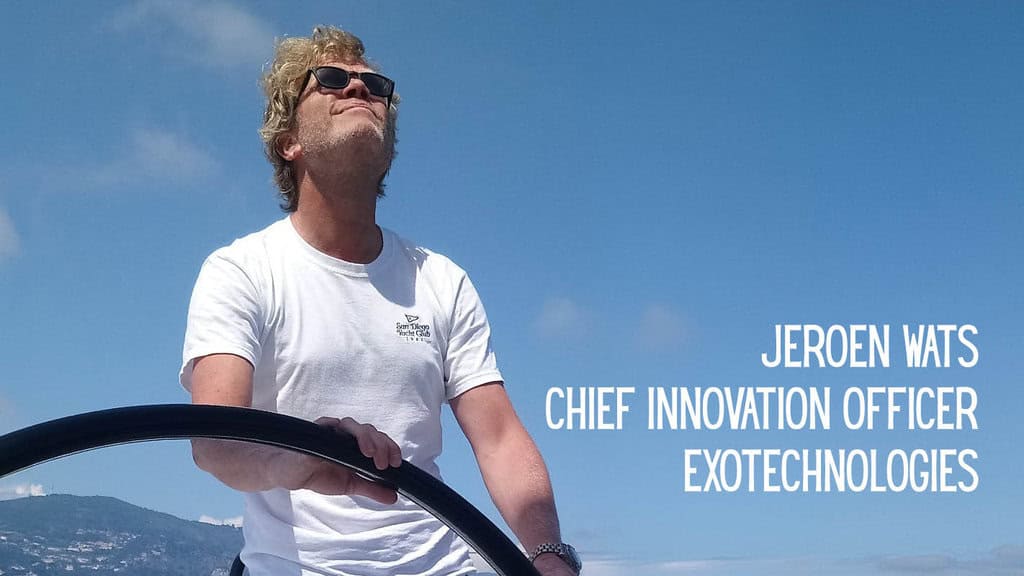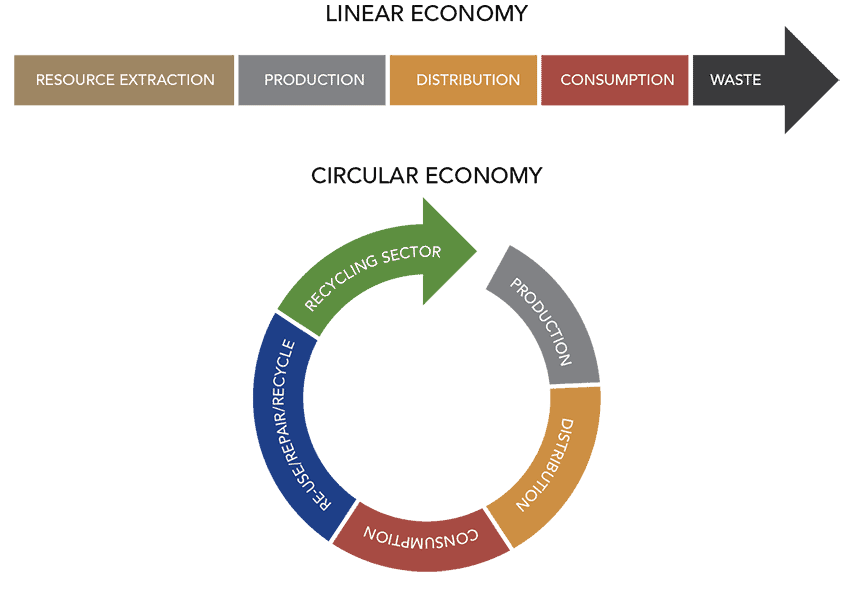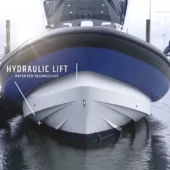
Innovating the Future with DANU for a.o. RIBs?
What does this innovation has to do with RIBs? Quite a lot more than you might expect. Earlier, I discussed this groundbreaking composite material.
In a world increasingly focused on sustainability and circular economy, the need for innovative manufacturing solutions has never been more pressing.
One such groundbreaking development is ExoTechnologies’ DANU Composite Technology used by Ultimate Boats.
We are on a mission to drive the green transition toward a circular economy within the composite industry.
This innovative material DANU offers a plethora of advantages for sustainable manufacturing, aiming to minimise environmental impact while maximising production efficiency.
Our fully recyclable composite material outperforms glass fibre.
After some research for this article, I delved into the intricacies of DANU Composite Technology, exploring its features, environmental benefits, economic advantages, and real-world applications.
Jeroen Wats, founder and CIO of Exo Technologies, tells all about it in this video. You can contact him via this emailadres and challenge him.
By examining these aspects, I hope to uncover how this technology sets a new standard for sustainable manufacturing, making it an attractive option for businesses and environmentally conscious individuals alike.
The Importance of Sustainable Manufacturing
The manufacturing sector has long been a significant contributor to environmental degradation, accounting for substantial carbon emissions and resource depletion.
As awareness of climate change and its implications rises, sustainable manufacturing practices are becoming imperative.
Sustainable manufacturing not only helps in conserving resources but also plays a crucial role in reducing waste and emissions, ultimately fostering a healthier planet.
For entrepreneurs, investing in sustainable practices can lead to enhanced brand reputation and customer loyalty.
Moreover, it often results in cost savings over time by reducing material wastage and energy consumption.
As the demand for eco-friendly products continues to surge, businesses that adopt sustainable manufacturing practices position themselves favourably in the marketplace.
Understanding DANU Composite Technology
What is DANU Composite Technology?
DANU Composite Technology is an advanced material which combines various sustainable resources to create a composite that is not only robust but also environmentally friendly.
Unlike traditional composite materials that often rely heavily on petroleum-based products,
The resins used in DANU are indeed based on petrochemicals, but significantly less so than, for example, vinylester or epoxy.
The advantage is that 90% of the resins return to their original state after recycling, and 100% of the fibers (provided they are not damaged by impact, for example).
DANU utilises renewable resources. This innovation marks a significant shift towards more sustainable practices in the manufacturing sector.
At its core, DANU integrates bio-based materials with innovative engineering techniques, resulting in a product that is lightweight and high-performing.
This technology is designed to replace conventional materials in various applications, thereby reducing the reliance on non-renewable resources.
Key Features and Innovations
Innovating the Future with DANU: One of the standout features of DANU Composite Technology is its remarkable versatility.
It can be engineered to meet the specific needs of diverse industries, from aerospace to automotive, while maintaining superior performance standards.
The technology also boasts a range of innovative properties, including enhanced durability, improved thermal resistance, and moisture repellence.
Additionally, DANU is designed for recyclability, further reducing its environmental footprint.
The Environmental Impact of DANU Composite Technology
Reduction of Carbon Footprint
The production of DANU Composite Technology is significantly more energy-efficient than that of conventional composites.
By minimising energy use in its manufacturing process, DANU directly contributes to a reduction in greenhouse gas emissions.
This shift is vital as industries work towards meeting global climate targets.
Moreover, the material’s lifecycle is designed to be environmentally friendly.
From sourcing raw materials to its end-of-life recyclability, DANU ensures that each stage of its existence is optimized for minimal environmental impact.
This comprehensive approach helps businesses achieve their sustainability goals while promoting a circular economy.
Resource Efficiency and Waste Minimisation
DANU Composite Technology emphasizes resource efficiency by utilizing bio-based materials that are sustainably sourced.
This not only lessens the demand for fossil fuels but also encourages the use of renewable resources.
With an increasing focus on circular economy principles, DANU offers an effective solution to the problem of waste in manufacturing.
Furthermore, the technology incorporates waste minimization strategies.
By using advanced processing techniques that reduce scrap and defective products, DANU ensures that resources are utilised to their fullest extent.
This operational efficiency is crucial for businesses aiming to reduce their environmental footprint.
Economic Advantages of Using DANU Composite Technology
Cost-Effectiveness in Manufacturing
Despite initial investments in sustainable technologies, long-term financial benefits often outweigh these costs.
DANU Composite Technology offers substantial cost savings by reducing energy consumption and material wastage during production.
These savings can significantly improve a company’s bottom line.
Moreover, the durability and performance of DANU composites can lead to reduced maintenance costs and longer product lifespans.
This means businesses can expect a better return on investment, as products made with DANU technology often have lower failure rates and can withstand harsher conditions.
Market Potential and Job Creation
The rise of sustainable manufacturing is accompanied by an increasing demand for eco-friendly products.
Companies using DANU Composite Technology are well-positioned to tap into this growing market segment.
This shift not only benefits individual businesses but also contributes to overall economic growth through job creation in sustainable sectors.
The integration of advanced technologies like DANU can lead to the development of new roles within organizations, spanning from research and development to production and sales.
As more businesses adopt sustainable practices, the potential for employment in green technologies continues to expand, creating opportunities for skilled labor in emerging industries.
Real-World Applications
Case Study of Successful Implementation
Ultimate Boats have successfully implemented DANU Composite Technology, showcasing its versatility and effectiveness in their boat constructions.
I ‘ve driven an M-class Boat by Ultimate Boats and never had such an experience with any other RIB. This was possible thanks to DANU and the incredible efficient hull design by John Moxham (check him out).

Industry Sectors Benefiting from DANU Technology
DANU Composite Technology has applications across multiple sectors, including automotive, aerospace, construction, and consumer goods.
In the automotive industry, its lightweight properties provide significant fuel savings, while in aerospace, reduced weight translates to lower operational costs and enhanced efficiency.
In construction, DANU technology is being explored for its potential in creating sustainable building materials, promoting energy efficiency in homes and commercial buildings.
Consumer goods manufacturers also benefit from DANU’s eco-friendly appeal, as modern consumers increasingly prefer products made from sustainable materials.
Future Prospects and Innovations
Future Developments in ExoTechnologies
As the demand for sustainable materials grows, ExoTechnologies is committed to continuous innovation.
Future developments may focus on enhancing the performance of DANU composites, exploring new bio-based materials, and refining production processes for even greater sustainability.
Moreover, ongoing research into the properties of DANU composites can lead to new applications across various industries, expanding its market reach and further solidifying its role in sustainable manufacturing.
Potential Challenges and Solutions
While the potential of DANU Composite Technology is significant, challenges remain.
The initial costs of developing and implementing new technologies can deter some businesses.
However, as more companies recognize the long-term financial and environmental benefits, this barrier is likely to diminish.
Additionally, there may be resistance to change from traditional manufacturing practices.
Educating stakeholders about the advantages of sustainable technologies and demonstrating successful case studies can help alleviate these concerns and pave the way for wider adoption.
Conclusion
Summarising the Benefits of Sustainable Manufacturing
Innovating the Future with DANU? Yes!
The journey towards sustainable manufacturing is critical for the health of our planet and the economy.
ExoTechnologies’ DANU Composite Technology stands as a beacon of innovation that not only meets the demands of today’s market but also addresses the pressing need for eco-friendly practices in manufacturing.
By integrating advanced materials like DANU into their operations, businesses can significantly reduce their environmental impact while enjoying economic benefits such as cost savings and enhanced market competitiveness.
The Call to Action for Entrepreneurs and Environmentalists
The adoption of sustainable manufacturing practices is no longer just an option; it has become a necessity for preserving our environment for future generations.
Entrepreneurs and environmentalists alike should advocate for the integration of technologies like DANU Composite Technology into various industries.
By embracing this innovation, we all can collectively work towards a more sustainable future, ensuring that economic growth does not come at the expense of our planet.
FAQs
What is DANU Composite Technology?
DANU Composite Technology is an advanced, eco-friendly material developed by ExoTechnologies, combining renewable resources to create lightweight and high-performing composites suitable for various industries.
How does DANU Composite Technology reduce environmental impact?
The composite innovation made of natural fibers which are considerably stronger than glass fibers and therefor less materials are needed to meet certain required mechanical properties.
The resins are free of styrene. The resins used in DANU are indeed based on petrochemicals, but free of styrene and significantly less so than, for example, vinylester or epoxy. and the materials can be recycled and re-used without the loss of mechanical properties
What industries can benefit from DANU Composite Technology?
DANU has applications across numerous sectors, including, automotive, boats, aerospace, construction, and consumer goods, offering sustainable alternatives that improve efficiency and performance.
What are the economic advantages of using DANU composites?
Using DANU composites can lead to cost savings through reduced energy consumption and material waste, while also appealing to a growing market for eco-friendly products, thus creating job opportunities.
What are the future prospects for DANU Composite Technology?
Future developments may focus on enhancing the material’s properties, exploring new applications, and refining manufacturing processes to further increase sustainability and performance.
Proud to share that Ultimate Boats is a Friend of RIBs ONLY.



